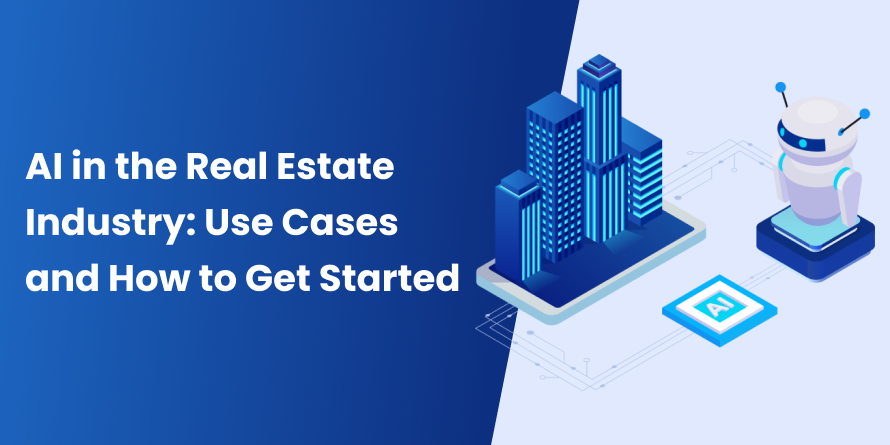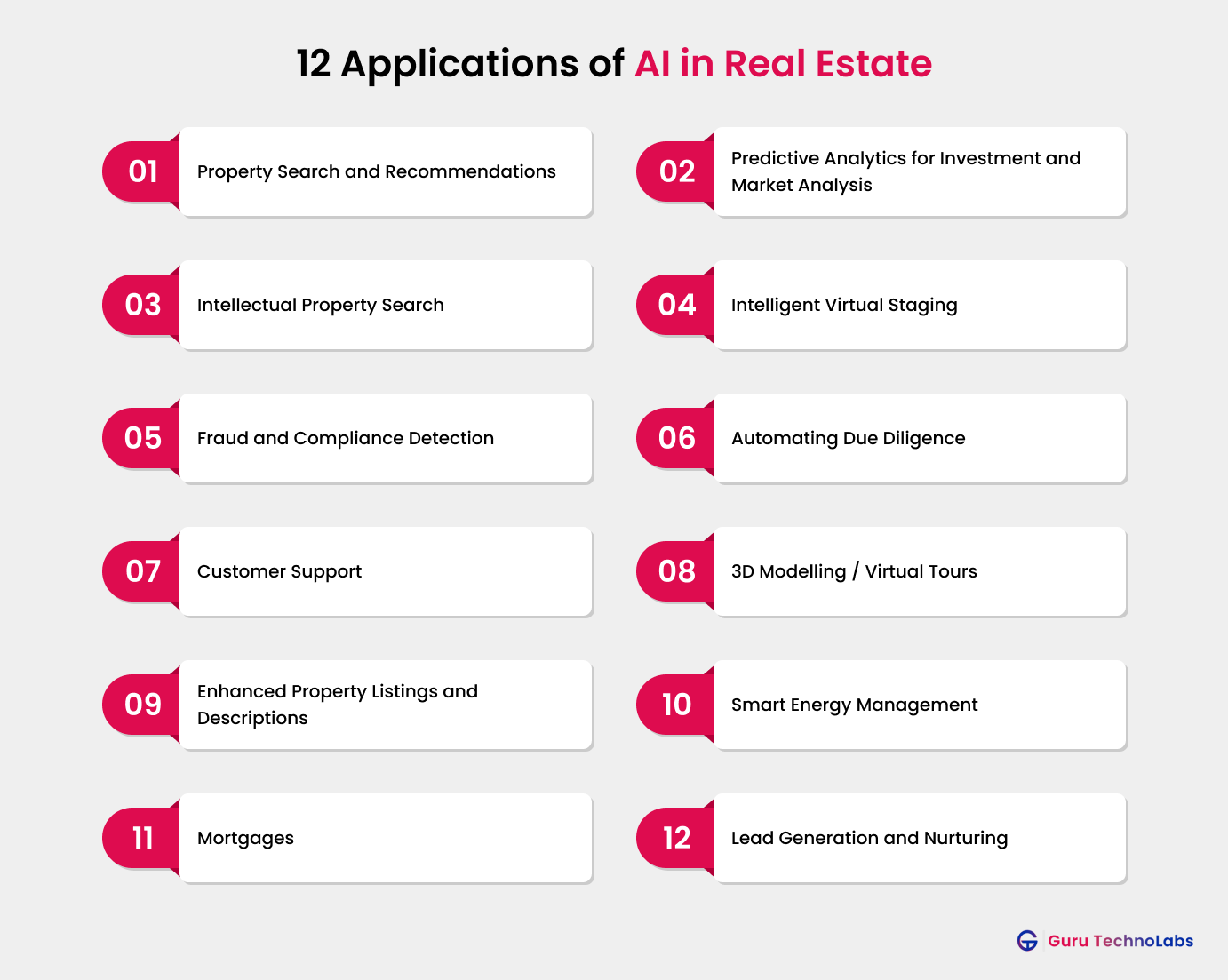AI in Real Estate Industry: Benefits, Applications, Challenges & Examples

Artificial Intelligence (AI) is transforming the real estate industry from the ground up — revolutionizing how properties are bought, sold, valued, and managed. What was once a traditional and paperwork-heavy sector is now evolving into a smart, data-driven, and customer-centric marketplace.
In 2025, AI in real estate is not just a buzzword. It’s fueling smarter property searches, personalized recommendations, predictive valuations, and automated workflows that save time and boost profitability for both buyers and agents. Imagine skipping endless property listings and instead receiving tailored options that perfectly match your budget, lifestyle, and location preferences. Or taking an immersive 3D tour of a property from your living room, powered by AI-driven virtual reality.
The impact is massive: the global AI in real estate market is projected to reach $731.59 billion by 2028, driven by platforms like Zillow, Trulia, MagicBricks, and 99acres that already leverage AI to deliver instant insights and better user experiences.
In this blog, we’ll explore the top AI use cases in real estate, the benefits for buyers and sellers, and how businesses can get started with this game-changing technology.
What is AI in the Real Estate Industry?
Artificial Intelligence (AI) in the real estate industry is more than just using smart tools for marketing or property photos. It’s a transformational force reshaping how properties are discovered, valued, managed, and sold. From automated valuations to AI-driven investment insights, the technology is redefining every stakeholder’s experience, including buyers, sellers, brokers, and property managers.
The AI in real estate market is experiencing rapid growth, projected to surge from $222.65 billion in 2024 to $303.06 billion in 2025, at a remarkable CAGR of 36.1%. This growth highlights how real estate is fast catching up with knowledge-heavy industries like finance and IT, where AI has already been integral to document analysis, risk prediction, and decision-making.
What makes AI particularly valuable in real estate is not just task automation, but its ability to:
- Process massive datasets in real time (property listings, buyer preferences, market trends).
- Deliver predictive insights that guide better investments and pricing strategies.
- Enhance customer engagement through personalized property recommendations, AI chatbots, and immersive virtual tours.
Key Impacts of AI in Real Estate Today:
- 70%+ of real estate brokerages now rely on AI-driven property valuations—improving accuracy and reducing human bias.
- AI-powered virtual tours boost buyer engagement by up to 60%, saving time for both buyers and agents.
- Predictive analytics in real estate investment has been shown to improve ROI by an average of 25%, helping investors identify profitable properties faster.
For modern real estate businesses, AI adoption is no longer optional, it’s a competitive necessity. Companies that implement robust AI strategies can advantage in an increasingly digital property market.
Why AI Matters in Real Estate (Key Benefits)
Incorporating AI technology into dating apps can bring numerous benefits to both users and businesses. Here are some of the key benefits:
1. Faster Transactions
AI accelerates the entire deal cycle by automating property searches, valuations, and even documentation. Tasks that once took weeks can now be completed in days, giving both buyers and sellers a smoother experience.
2. Data-Driven Decisions
With AI crunching massive datasets, market trends, buyer behavior, and property histories, agents and investors can make smarter, evidence-based decisions rather than relying on intuition alone.
3. Personalized Customer Experiences
AI-powered chatbots, recommendation engines, and virtual tours tailor the property journey to each buyer. This personalization increases engagement and builds stronger client relationships.
4. Reduced Costs and Risks
From predictive maintenance that prevents costly repairs to fraud detection in transactions, AI minimizes risks while reducing operational expenses, directly improving profit margins.
Traditional Real Estate and AI-Powered Real Estate Business
| Aspect | Traditional Real Estate | AI-Powered Real Estate |
|---|---|---|
| Search | Manual, agent-dependent | Automated, personalized recommendations |
| Valuation | Human judgment, subjective | Data-driven, real-time, bias-free |
| Marketing | Mass campaigns, low targeting | Predictive, personalized, higher ROI |
| Customer Support | Limited, agent availability | 24/7 AI chatbots + virtual tours |
| Transactions | Paperwork-heavy, slow | Automated, faster, error-free |
12 Applications of AI in Real Estate
AI is booming in real estate, revolutionizing everything from property searches to lease management. Below, we dive deep into 12 transformative applications of AI in real estate, each reshaping the sector in unique ways.

1. Property Search and Recommendations
AI-powered property search platforms utilize machine learning algorithms to analyze user preferences, historical search activity, and real-time market data. This enables highly relevant, personalized property recommendations that streamline the search process for buyers and renters.
AI has revolutionized property search platforms by leveraging:
- Personalized Filtering: Machine learning assesses user preferences, online behaviors, past searches, and even color or design inclinations to deliver highly targeted property recommendations.
- Dynamic Search Experience: Advanced algorithms allow intuitive, conversational, and even visual property searches, going beyond rigid filters to surface properties aligned with nuanced preferences.
- Contextual Property Analysis: AI can integrate hyperlocal data, like sunlight exposure, neighborhood noise, and nearby amenities, enriching the decision process for buyers.
AI-driven interfaces also offer natural language search and behavioural analysis to refine results further, making home discovery intuitive and efficient. Large platforms leverage AI chatbots for interactive assistance, enabling users to ask specific questions and immediately receive tailored property suggestions.
2. Predictive Analytics for Investment
By processing extensive datasets – including economic indicators, historical pricing, local development, and buyer behaviour – AI can accurately forecast market trends and property values. These predictive insights empower real estate professionals and investors to anticipate market changes, evaluate investment risk, and make data-driven decisions about where and when to buy or sell.
Forecasts such as rental yield and projected appreciation are accessible to both large portfolio managers and individual investors, maximizing returns and minimizing risk.
AI models empower investment strategy with:
- Market Trend Forecasting: By ingesting economic indicators, property histories, infrastructure changes, and more, AI predicts pricing trends and investment hotspots for both residential and commercial assets.
- Automated Valuation Models (AVMs): These estimations adjust in real time with shifting market data, providing up-to-date insights on returns and risks.
- Yield and Risk Simulations: AI can simulate possible investment outcomes under varied market conditions, enabling smarter portfolio allocation decisions.
3. Intellectual Property Search
Intellectual property may not be the first thing real estate professionals think about, but it’s crucial for real estate apps, architects, and marketers in today’s competitive market.
AI-powered IP search tools can automatically scan trademark, copyright, and patent databases to ensure that branding elements, community names, or design ideas linked to a real estate venture are legally compliant and unique.
How it helps:
- Brand Protection: Instantly flags duplicate names or design conflicts, preventing costly disputes.
- Faster Clearance: Automates legal checks during early project stages, saving time and effort.
- Creative Freedom: Suggests safe, alternative options when conflicts are detected.
For example, if a new luxury tower is being marketed under a name that already exists, AI can alert the developer immediately and recommend compliant alternatives. This ensures smooth project rollouts while safeguarding brand integrity both online and offline.
4. Intelligent Virtual Staging
First impressions matter, especially in property browsing. AI-driven virtual staging enhances how properties are visually presented without the need for costly physical staging efforts.
This technology uses computer vision and generative AI to insert hyper-realistic furniture, lighting, and decor into photographs of empty or outdated properties, helping buyers envision the potential of a space almost instantly.
What makes AI-powered staging compelling is its flexibility and audience targeting. Properties can be staged differently for different demographics -minimalist for modern professionals, warm and homey for families, or sleek and luxurious for upper-market buyers.
Agents can quickly produce multiple staging versions depending on audience behaviour or marketing campaigns. Furthermore, many platforms now integrate augmented reality (AR), letting users overlay staged elements on their mobile screens during virtual tours.
Listings with digitally staged images often experience higher click-through and retention rates, making virtual staging a marketing asset as well as an aesthetic enhancement.
5. Fraud and Compliance Detection
Real estate transactions often involve large sums, multi-party documentation, and regulatory scrutiny, all of which make the industry a target for fraud and financial malpractice. AI significantly reduces these risks through real-time fraud detection and compliance monitoring.
Algorithms analyze documentation, financial trails, and behavioral anomalies to flag unusual activity such as forged documents, identity impersonation, or shell account transactions.
AI improves transaction integrity by analyzing contracts, user patterns, and KYC documents to uncover anomalies indicative of fraud, such as identity theft or financial misconduct.
Here’s how:
- Real-Time Anomaly Detection: Systems flag irregular entries in financial records or forged documents.
- Automated Regulatory Alerts: AI ensures adherence to anti-money laundering (AML) laws and fair housing guidelines.
- Red Flag Tracking: The system builds a behavioral baseline, making it easier to spot suspicious borrowers or properties.
AI systems also scan transactions against local and international regulatory requirements such as Anti-Money Laundering (AML) protocols or Know Your Customer (KYC) guidelines. These systems continually learn from internal case data and global fraud patterns to improve their detection accuracy over time.
Additionally, by applying natural language processing, AI can interpret unstructured legal documents and ensure that all policies and disclosures are compliant with housing regulations, helping brokers and lenders avoid penalties or disputes.
6. Automating Due Diligence
One of the most time-consuming and error-prone areas in real estate is due diligence, especially during the acquisition of high-value or commercial properties. This process involves reviewing land titles, zoning permissions, historical ownership documents, financial records, and legal compliance tasks that can span weeks.
Preparing for a property transaction can involve reviewing hundreds of documents. AI simplifies this through:
- NLP-powered Document Review: Quickly extracting, verifying, and cross-checking information from sales deeds, zoning laws, and ownership records.
- Auto-validation of Records: AI tools flag missing data or legal inconsistencies, often overlooked during manual review.
- Time-saving Workflows: Legal and compliance teams receive summaries of critical red flags, which speed up decision-making.
Through AI-enabled automation, stakeholders can receive summaries of leases, spot discrepancies, and get validation alerts for missing clauses or out-of-date entries, all in seconds. More advanced platforms also allow side-by-side comparison of standard documents with received ones, flagging inconsistencies in clauses that could signal buyer risk or legal contention.
As a result, due diligence becomes faster, more thorough, and less reliant on manual legal review.
7. Customer Support with Chatbots
Exceptional customer service is integral to property businesses, particularly when dealing with multiple leads, ongoing deals, and tenant inquiries. AI enhances this experience by managing customer support via virtual agents and chatbots, which are available 24/7.
These tools can answer frequently asked questions, schedule site visits, share documentation, and provide updates on transaction status.
Advanced bots use natural language understanding to hold contextual conversations, mirroring human interaction closely. As they learn from past conversations, they become better at providing accurate, fast responses. AI tools also engage leads automatically based on their activity, such as sending reminders for unscheduled property visits or follow-ups after inquiries.
8. 3D Modelling / Virtual Tours
Virtual technology is becoming a game-changer in the real estate industry, with digital twins leading the charge. These AI-generated, computer-based models allow users to interact with a property remotely, offering a more immersive and efficient way to explore spaces.
One of the top names in this field is Matterport, now under the umbrella of CoStar (CSGP 0.33%). Matterport specializes in producing 3D virtual property tours that use augmented reality to give potential buyers a realistic sense of space- long before they step inside.
The company’s Cortex AI powers these experiences through advanced computer vision, image processing, and deep learning to automate the creation of highly accurate 3D models.
This technology not only expands access to properties by making them viewable on any connected device but also streamlines the sales process. By helping filter serious buyers from casual viewers, it saves time and money for agents and sellers alike. In many cases, integrating these innovations is most effective when paired with a solid property management system, a vital tool for any business managing multiple assets and listings.
Meanwhile, several startups are pushing the envelope further, offering advanced visualization of properties still in the design phase. These tools are proving invaluable to architects and developers, especially when paired with features like real-time cost estimation based on various design configurations.
9. Enhanced Property Listings With Generative AI
Real estate agents are increasingly turning to Generative AI to craft customized property descriptions, eliminating the need to write them manually.
Studies show that drafting a single property description by hand can take anywhere from 30 to 60 minutes. For brokers managing hundreds—or even thousands—of listings, this becomes a time-consuming and labor-intensive task. On top of that, human error is common.
When dealing with a high volume of properties, agents may accidentally leave out key details or confuse information between listings. These oversights can lead to buyer dissatisfaction and unnecessary disputes.
By leveraging generative AI tools, agents can significantly cut costs, as there’s no longer a need to employ dedicated staff for writing descriptions. AI platforms like ChatGPT can generate compelling and accurate property write-ups by analyzing features such as the number of rooms, location, and unique selling points. Tools like Epique and Editpad’s Paragraph Generator also simplify the process, making it faster and more efficient to create engaging, informative listings.
10. Smart Energy Management
According to the International Energy Agency, buildings are responsible for nearly 30% of global final energy consumption and 26% of energy-related emissions. Monitoring and managing a building’s energy use manually can be a time-consuming and inefficient process. This highlights the growing need for integrating AI into real estate operations to promote environmental sustainability.
An AI-powered energy management system (EMS) can play a crucial role by continuously analyzing real-time energy consumption data to detect inefficiencies and optimize usage.
Such a system can automate HVAC operations, reduce energy costs by up to 25%, and lower emissions by as much as 40%. Integrating this technology into platforms like real estate portals can further streamline energy management across properties, making sustainable practices more accessible and efficient.
11. AI in Mortgages
Artificial Intelligence is increasingly being adopted in the financial sector, particularly in mortgage lending. In the underwriting process, AI analyzes borrower data, such as credit history, income, and employment details to assess risk levels and determine the most appropriate interest rate.
AI also enhances fraud detection and prevention, while streamlining loan servicing tasks like processing payments and managing customer interactions. Some lenders, including Rocket Companies (RKT 1.97%), are leveraging AI to provide near-instant decisions on mortgage applications.
For example, Rocket Companies offers mortgage approvals in as little as eight minutes. In April 2024, it introduced Rocket Logic, an AI-powered platform to simplify the home loan application process and speed up approval times for buyers.
12. Lead Generation and Nurturing
AI is transforming lead generation and nurturing in the real estate sector by automating and enhancing how potential clients are identified, engaged, and converted. Traditional lead generation methods – like manual data entry, cold calling, and broad marketing – are often inefficient and time-intensive.
AI streamlines this process by analyzing large datasets from sources such as social media, website activity, and past client behaviour to pinpoint high-potential leads with greater accuracy.
AI-powered CRM systems take this a step further by using machine learning to score leads based on their likelihood and conversion. This allows agents to focus their efforts on the most promising prospects.
Moreover, these intelligent CRM tools can automate follow-ups, including emails, messages, and reminders, ensuring consistent communication and minimizing the risk of losing track of leads.
Real-world Examples of AI Applications in Real Estate
Artificial intelligence is reshaping the real estate landscape by enhancing everything from property discovery to valuation and client engagement. Several innovative companies are leading the way, leveraging AI to deliver smarter, faster, and more personalized real estate experiences.
Zillow
Zillow uses AI to power its Zestimate tool, delivering real-time home value estimates with surprising accuracy. Its machine learning models also personalize property recommendations for users based on their browsing behavior.
Matterport
This platform uses AI-driven 3D scanning to create immersive virtual property tours, revolutionizing remote viewing. Its platform also uses image recognition to generate floor plans and measure spaces automatically.
RealScout
RealScout leverages AI to match buyers with homes based on detailed lifestyle preferences and search behavior. It empowers agents with predictive insights to engage clients at the right moment.
HouseCanary
The platform uses AI to analyze millions of data points for precise real estate valuations and market forecasts. Its tools help investors and appraisers make smarter, data-backed decisions.
SurfaceAI
SurfaceAI uses generative AI to enhance real estate listings with compelling visuals and descriptions. It helps agents create high-converting marketing materials in minutes, reducing manual effort.
Challenges of AI Adoption in Real Estate
1. Data Privacy & Compliance
Real estate involves handling sensitive client data, from financial records to personal details. With stricter regulations like GDPR and local compliance laws, ensuring that AI systems manage this information securely is critical. One misstep could lead to legal penalties and loss of customer trust.
2. Cost of Implementation
AI solutions, especially advanced tools like predictive analytics or 3D modelling systems, come with high upfront costs. Smaller agencies may find it tough to justify the investment without a clear ROI strategy.
3. Integration with Legacy Systems
Many real estate firms still rely on outdated CRMs or property management platforms. Plugging AI into these legacy systems can be complex, requiring technical upgrades and staff training.
4. Risk of Over-Reliance on AI
While AI is powerful, it’s not a substitute for human judgment. Over-dependence could lead to impersonal client experiences or errors when the tech misinterprets data. Striking the right balance between AI-driven efficiency and the human touch is key.
How to Get Started with AI in Real Estate
Getting started with AI in real estate may sound complex, but it doesn’t have to be. With the right steps, you can introduce it into your business without feeling overwhelmed. Here’s a straightforward way to begin:
1. Identify use cases
Look at the parts of your business that could benefit the most, like property recommendations, price predictions, lead generation, or even customer support. Start with one area and expand as you go.
2. Select the right tools & vendors
Not every platform or vendor will match your needs. Take the time to choose reliable technology partners who understand the real estate space. A seasoned real estate app development company can make the process much smoother.
3. Train your teams
Your team is key to making AI work. Offer training so they know how to use the tools effectively and feel confident working with them day to day.
4. Ensure compliance & governance
Real estate deals with a lot of sensitive information. Make sure your setup follows data privacy rules and has proper checks in place. This keeps your business safe and builds client trust.
5. Monitor performance
and make small improvements over time. This is how you get long-term value.
Implementing AI in the real estate industry demands the right expertise. Partnering with a skilled real estate app development company is essential to unlock the full potential of AI in your operations.
Looking to build an AI-powered real estate app or portal? Contact us today and let’s bring your vision to life!
Frequently Asked Questions
AI is utilized in real estate for tasks like forecasting market trends, accurately estimating property values, offering tailored property suggestions, analyzing large datasets, and streamlining routine administrative processes.
While AI is making significant strides, it's unlikely to fully replace human agents. Many aspects of real estate rely heavily on human judgment and interaction. Instead, AI is expected to complement the industry by improving efficiency and reducing operational costs.
Absolutely. AI can identify and qualify leads by analyzing data such as user behavior, income, and preferences. It also automates routine follow-ups and email outreach, allowing agents to focus their time on high-potential prospects.
The investment depends on the complexity and scale of the solution—ranging from affordable AI software subscriptions to more advanced, custom-built platforms.
Each real estate technology model has its strengths, but the ideal choice depends on your business goals, scale, and customer experience priorities.
- Traditional real estate tech focuses on established tools like CRM systems, property listing portals, and manual data entry. It’s reliable but often lacks automation, predictive insights, and personalization.
- AI-powered platforms take real estate technology to the next level by using artificial intelligence for data analysis, property valuation, customer matching, and virtual tours. These platforms deliver faster decision-making, better lead targeting, and improved user experiences through automation and predictive modeling.
- Hybrid solutions combine the best of both, the stability and familiarity of traditional systems with the intelligence of AI. This model allows real estate businesses to gradually adopt automation while maintaining control over core processes.


















